Don't get me wrong, I enjoyed the readings. I think it is safe to say that I enjoyed reading Turkle a little more than Wesch tonight but I think that both articles offer valid points, and arguments and information. But "are they allies?" or "are they opponents?", I am really not sure. So I took some time to read a few other blogs to see if I could stir up some ideas.
After careful consideration, I felt that Amy hit the nail on the head. She was able to help me see what I just couldn't tease out myself, at 9:00 at night, at the conclusion of day 4 of class, with 2 young girls that are missing me during the day and a little extra needy in the evening, and making dinner, and, and, and...
Anyway, Amy so eloquently stated "I feel that the relationship between Turkle and Wesch is that they are both studying the world of people, how we learn and interact. I don’t see them as allies or opponents. Turkle is studying the idea that people are too attached to their devices and should step back to learn better conversation skills. Whereas Wesch is adjusting his classroom to better fit our changing world and the way students learn best."
and all I can say is "I AGREE".
and all I can say is "I AGREE".
Even living in today's society, I am continuously shocked and amazed (and a little guilty myself) of the amount of time we spend hooked up to a device. I mean, do you really need to pull your bike over on the side of the road to take that phone call? Do you need to be checking your Facebook at the dinner table? Why do we feel the need to be "plugged in" all the time? It wasn't that long ago that people had conversations, real face to face talking conversations. Where you clearly understood the meaning and context of the conversation because you could hear the intonation in her voice and see the expression on her face. You were not left analyzing the meaning by reading the text over and over and over, wondering just what she meant when she said...
I worry that we as a society are losing our interpersonal skills. As Turkle says, we have "confused conversation with connection" and I think its a slippery slope, and a dangerous one at that.
I worry that we as a society are losing our interpersonal skills. As Turkle says, we have "confused conversation with connection" and I think its a slippery slope, and a dangerous one at that.

















